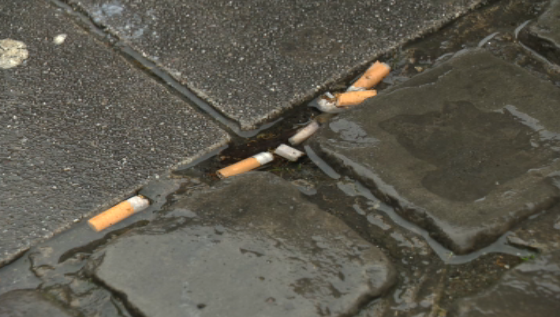The impact of cigarette butts on the environment extends to electronic cigarettes as well, according to a new campaign by The ACT-Alliance in cooperation with the ocean environmentalists at the Surfrider Foundation.
The new awareness campaign, aimed at individuals aged 15 to 24, hopes to highlight this issue of hazardous and ecotoxic cigarette waste, including both traditional and electronic cigarettes.
Approximately 4,500 billion cigarette butts are discarded annually worldwide. These associations emphasize that there is currently no safe or environmentally-friendly method of recycling this waste. Improper disposal of cigarette and e-cigarette waste contributes to pollution in ecosystems, posing a serious threat to wildlife and aquatic life.
Cigarette butts are a significant source of pollution. When thrown on the ground, they are often carried away by rainfall runoff, ending up in drains, rivers, beaches, and oceans.
Chemicals seep from the butts into water, making them acutely toxic to fish and microorganisms. Heavy metal contamination originating from discarded butts can also disrupt aquatic ecosystems. Cigarette waste also affects soil, with hydrocarbons from littered butts leaching into the surrounding soil, posing health risks to wildlife and humans.

Credit: Belga / Herwig Vergult
Proper disposal methods are crucial to combat this issue. Smokers should use designated receptacles for cigarette butts to prevent pollution of soil, beaches, and waterways. Public awareness regarding the harmful effects of cigarette waste and responsible disposal is therefore necessary.
A number of tobacco organisations were approached by The Brussels Times but only one agreed to comment on the issue.
"Innovation in filters that aims to both reduce plastic content while also meeting consumer needs, is continuing in our sector, but also requires time," Nathalie Darge, director of Tobacco Europe told The Brussels Times.
"Member companies are investing significant resources to meet Extended Producer Responsibility schemes requirements. That, together with ongoing R&D investments, we hope both the Commission and Member States will encourage innovation and constructive dialogue with our sector as we seek to provide our consumers with more sustainable products," Darge continued.
E-cigs hazard?
Disposable electronic cigarettes also contribute to environmental problems. These devices, made of plastic, lithium batteries, and heavy metals, cannot be recycled easily.

Credit: Belga / Nicolas Maeterlinck
A survey by BVA for the ACT-Alliance revealed that 37% of smokers mistakenly believe that disposable e-cigarettes are recyclable, highlighting the lack of awareness surrounding their environmental impact. E-cigarettes contain hazardous substances, and their cartridges and refills can seep nicotine salts and heavy metals into the environment.
Lithium-ion batteries used in e-cigarettes pose a primary concern for disposal. They must be discharged, cooled, and submerged in cold saltwater for safe disposal. Failure to follow these precautions can result in explosions and fires.
Education and awareness campaigns are essential to address the threat of cigarette butt pollution. By dispelling misconceptions and providing accurate information, the ACT-Alliance and Surfrider Foundation aim to empower young individuals to make informed choices and take action to protect the environment.

